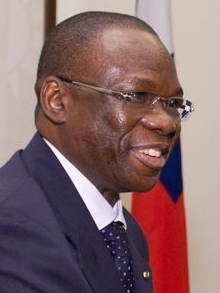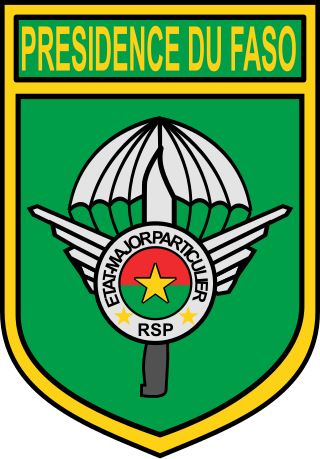| |||||
| Decades: | |||||
|---|---|---|---|---|---|
| See also: | |||||
Events in the year 2011 in Burkina Faso .
| |||||
| Decades: | |||||
|---|---|---|---|---|---|
| See also: | |||||
Events in the year 2011 in Burkina Faso .

Burkina Faso is a landlocked country in West Africa. It covers an area of 274,223 km2 (105,878 sq mi), bordered by Mali to the northwest, Niger to the northeast, Benin to the southeast, Togo and Ghana to the south, and Ivory Coast to the southwest. As of 2021, the country had an estimated population of 23,674,480. Previously called the Republic of Upper Volta (1958–1984), it was renamed Burkina Faso by President Thomas Sankara. Its citizens are known as Burkinabè, and its capital and largest city is Ouagadougou.

The history of Burkina Faso includes the history of various kingdoms within the country, such as the Mossi kingdoms, as well as the later French colonisation of the territory and its independence as the Republic of Upper Volta in 1960.

Thomas Isidore Noël Sankara was a Burkinabè military officer, Marxist revolutionary and Pan-Africanist who served as President of Burkina Faso from his coup in 1983 to his assassination in 1987.

Blaise Compaoré is a Burkinabé-Ivorian former politician who served as the second president of Burkina Faso from 1987 to 2014. He was a close associate of the first president, Thomas Sankara, during the 1980s and in October 1987 he led a coup d'état during which Sankara was killed. Subsequently, he introduced a policy of 'rectification', overturning the leftist and Third Worldist policies pursued by Sankara. He won elections in 1991, 1998, 2005, and 2010, in what were considered unfair circumstances. His attempt to amend the constitution to extend his 27-year term caused the 2014 Burkinabé uprising. On 31 October 2014, Compaoré resigned, whereupon he fled to the Ivory Coast. In April 2022, he was found guilty by a special military tribunal of complicity in Sankara’s murder. He is also the longest-serving president of Burkina Faso.

Chantal Compaoré, born Chantal Terrasson de Fougères is the Franco-Ivorian wife of former President Blaise Compaoré of Burkina Faso. Born in the Dabou, Ivory Coast, after becoming the First Lady in 1987 she spent much of her time on charity work in Burkina Faso. Her husband, who came to power in a bloody 1987 military coup, was overthrown in the 2014 Burkinabé uprising. Chantal Compaoré was subsequently forced to flee to her home country, going into exile together with her husband.
The 2011 Burkina Faso protests were a series of popular protests in Burkina Faso.

Luc-Adolphe Tiao is a Burkinabé politician and journalist who was Prime Minister of Burkina Faso from 2011 to 2014.

General elections were held in Burkina Faso on 29 November 2015. The elections were the first national elections in the country since the 2014 Burkinabé uprising and the departure of President Blaise Compaoré, who had ruled Burkina Faso for 27 years. The party of former President Compaoré, the Congress for Democracy and Progress, was banned from presenting a presidential candidate in the presidential elections but was still able to participate in the parliamentary election.

The 2014 Burkina Faso uprising was a series of demonstrations and riots in Burkina Faso in October 2014 that quickly spread to multiple cities. They began in response to attempts at changing the constitution to allow President Blaise Compaoré to run again and extend his 27 years in office. Pressure for political change came from civil society and in particular from the country's youth. Following a tumultuous day on 30 October, which included the involvement of former Defence Minister Kouamé Lougué and the burning of the National Assembly and other government buildings as well as the ruling Congress for Democracy and Progress party's headquarters, Compaoré dissolved the government and declared a state of emergency before eventually fleeing to Côte d'Ivoire with the support of Ivorian President Alassane Ouattara.

Burkina Faso–Taiwan relations referred to the historical relationship between the Republic of China (Taiwan) and Burkina Faso. Taiwan had an embassy in Ouagadougou, and Burkina Faso had an embassy in Taipei. In May 2018, Burkina Faso switched to recognize the People's Republic of China, thus ending diplomatic ties with Taiwan. The last ambassador of Burkina Faso to Taiwan, appointed in August 2017, was Aminata Sana Congo.

The Regiment of Presidential Security, sometimes known as the Presidential Security Regiment, was the secret service organisation responsible for VIP security to the President of Burkina Faso, a landlocked country in West Africa. It was autonomous from the Army. Until 31 October 2014, the President was Blaise Compaoré, a military officer who came to power in a 1987 coup d'état. The elite unit was well known for its frequent involvement in the politics of Burkina Faso, acting as the iron fist of President Compaoré in his domination of the country. They were said to be widely feared by many people in the country, which in 2012 – two years prior to the end of Compaoré's government – was described by the Democracy Index as an "authoritarian regime".
The following lists events that happened during 2014 in Burkina Faso.
The 2003 Burkina Faso coup d'état attempt was an alleged plot in the landlocked African country Burkina Faso that took place in October 2003. The attempted coup was carried out against long-time strongman President Blaise Compaoré and his CDP regime, and resulted in the imprisonment of several members of the military and political dissidents. Over a decade later, Compaoré would finally be overthrown in the 2014 Burkina Faso uprising.

Burkina Faso–India relations refers to the international relations that exist between Burkina Faso and India. Burkina Faso maintains an embassy in New Delhi. India maintained an embassy in Ouagadougou from November 1996 until its closure in July 2002. Currently, India maintains an honorary consulate in Ouagadougou, which functions under the jurisdiction of the High Commission of India in Accra, Ghana.
On 4 August 1983, a coup d'état was launched in the Republic of Upper Volta in an event sometimes referred to as the August revolution or Burkinabé revolution. It was carried out by radical elements of the army led by Thomas Sankara and Blaise Compaoré, against the regime of Major Jean-Baptiste Ouédraogo. Ouédraogo had been brought to power in a 1982 coup with the Conseil de Salut du Peuple (CSP), a body composed of military officials of different ideological backgrounds. The CSP chose Sankara as Prime Minister of Upper Volta in January 1983. As his tenure progressed, Ouédraogo found himself unable to reconcile the conservative and radical factions of the CSP, whose disagreements were leading to a political stalemate. On 16 May he purged his government of pro-Libyan and anti-French elements, disbanded the CSP, and had Sankara and several other important officials arrested. This move sparked discontent among Sankara's supporters. Sankara was eventually released while one officer, Compaoré, began to organise military resistance to the government.

On 19 January 2019, the government of Burkina Faso dissolved due to the resignation of Prime Minister Paul Kaba Thieba and all members of his cabinet. President of Burkina Faso Roch Marc Christian Kaboré announced that he intends to form a new government; on 21 January, he began the process of appointing a new government by naming Christophe Joseph Marie Dabiré as the new Prime Minister, but his cabinet remains vacant. In the days leading up to the resignation of the government, the country faced a number of attacks from militant terrorist groups, and opposition members of government had previously called for the prime minister and defense ministries to step down, citing an inability to address terrorist attacks.
Events in the year 2013 in Burkina Faso.
Events in the year 2012 in Burkina Faso.
Events in the year 2010 in Burkina Faso.
Events in the year 2009 in Burkina Faso.